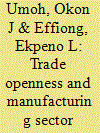| Srl | Item |
| 1 |
ID:
107519


|
|
|
|
|
| Publication |
2011.
|
| Summary/Abstract |
This study takes a fresh look at the direction of causality between energy consumption and economic growth in China during the period from 1972 to 2006, using a multivariate cointegration approach. Given the weakness associated with the bivariate causality framework, the current study performs a multivariate causality framework by incorporating capital and labor variables into the model between energy consumption and economic growth based on neo-classical aggregate production theory. Using the recently developed autoregressive distributed lag (ARDL) bounds testing approach, a long-run equilibrium cointegration relationship has been found to exist between economic growth and the explanatory variables: energy consumption, capital and employment. Empirical results reveal that the long-run parameter of energy consumption on economic growth in China is approximately 0.15, through a long-run static solution of the estimated ARDL model, and that for the short-run is approximately 0.12 by the error correction model. The study also indicates the existence of short-run and long-run causality running from energy consumption, capital and employment to economic growth. The estimation results imply that energy serves as an important source of economic growth, thus more vigorous energy use and economic development strategies should be adopted for China.
|
|
|
|
|
|
|
|
|
|
|
|
|
|
|
|
| 2 |
ID:
178839


|
|
|
|
|
| Summary/Abstract |
This study aligns with Sustainable Development Goal 7 which aims at “ensuring access to affordable, clean energy, reliable, sustainable and modern energy for all”. The Gazetted Flare Gas Regulations 2018 provides a legal framework to support the policy objectives of the Federal Government for the reduction of Green House Gas emissions through the flaring and venting of natural gas. The Regulations provide the legal basis for the implementation of the Nigerian Gas Flare Commercialization Programme. This study investigates the factors contributing to gas flaring activities in Nigeria from 1970 to 2019. Using the autoregressive distributed lag error correction representation and cointegration techniques, findings reveal, among others, that in the long-run: (1) gas flaring activities is persistent; (2) economic growth induces flaring activities; (3) gas prices exert asymmetric impact; (4) gas utilization and fossil fuel are negative predictors. The result shows that gas price contemporaneously exerts positive and statistically significant impact at the 1% level. Gas price contributes 0.187 percent increase to gas flaring while its first lag induces significant reduction in gas flaring by 0.293 percent at 1 percent level of significance. This study also provides sufficient evidence on the persistency of gas flaring activities in Nigeria.
|
|
|
|
|
|
|
|
|
|
|
|
|
|
|
|
| 3 |
ID:
122453


|
|
|
|
|
| Publication |
2013.
|
| Summary/Abstract |
How important is trade openness as a vehicle for driving productivity in developing countries? We offer a sector-specific analysis with focus on the manufacturing sector for meaningful policy insights. Using a modern econometric technique-the autoregressive distributed lag approach to cointegration-this article attempts to establish the relationship between openness to trade and manufacturing performance in Nigeria for the period 1970-2008. The results suggest that trade openness has a significant positive impact on manufacturing productivity in Nigeria both in the short and long run. These coefficient estimates are robust and stable over the time. Therefore, the policy direction for the manufacturing sector in Nigeria should focus more on open policies through trade liberalisation as a long-term plan. Reduction in trade restrictions and implementation of appropriate incentives are vital for resuscitating the performance of the sector. In this aspect, policy-makers should leverage the benefits of openness to the comparative advantages in the liberalised sector.
|
|
|
|
|
|
|
|
|
|
|
|
|
|
|
|